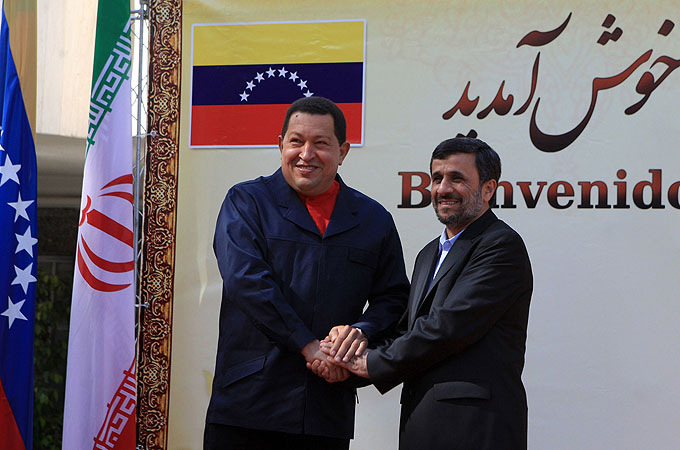Harry Lam
Journal Staff
In an attempt to create a world free of U.S. hegemony, Venezuela’s president, Hugo Chavez, has been traveling though Eastern Europe and the Middle East, signing energy deals with Russia, visiting Iran’s capital, and claiming to supply Belarus with oil for the “next 200 years.” Other stops in his tour include Ukraine, Syria, Libya, Algeria, and Portugal.
Chavez is an opponent of U.S. foreign power and hegemony and is trying to counter U.S. dominance in global affairs. Venezuela has the sixth largest oil reserves in the world and is looking to diversify the countries to where Venezuela exports oil.
His first stop was in Russia where he met with Russian President Dmitry Medvedev. The Russian president called the meeting as one “between two friends,” and Chavez referred to him as “brother.” The relationship between the two countries is now expanding outside of arms deal. They signed several deals in finance, housing, and agriculture, as well as a deal where the Russians will help build Venezuela’s first nuclear power plant and two 1,200-megawatt nuclear reactors. Russia also agreed to sell Venezuela tanks, and buy $2.6 billion in Venezuelan oil assets.
In agreement with Chavez’s belief in a multi-polar world, Medvedev said, “Both Russia and Venezuela favor the development of a modern and just world order – world order on which our future does not depend on the will or desire of any one country.”
Both claimed the nuclear deal is peaceful although it will raise suspicion from the U.S.
“I already know that it will make someone shudder…I would like to underline that our intentions are clean and open,” said Medvedev.
Chavez slammed the U.S. blaming Washington for their dependence on fossil fuels. “We are still too dependent on oil because the Yankee Empire imposed that model on us,” he said.
When Chavez met with Iranian president Mahmoud Ahmadinejad in Iran, they signed several deals ranging from issues of technology transfer, industry, agriculture, textiles, natural gas, commerce, housing, and mining.
The Iranian minister for housing and urban development announced that several experts would travel to Venezuela to help construct 50,000 houses. The deal follows another with Russia to finance the construction of 7,000 houses in Venezuela.
The two also affirmed to continue their alliance against U.S. imperialism to form a new world order. “We are united and determined to end the current unjust which dominates the world and replace it with a new world order based on humanity and justice,” said Ahmadinejad in a joint news conference. “We believe that the only result of bullying movements of imperialism all around the world, and especially in Latin America, will be the fast decline of imperial power.”
At the same time, Chavez condemned international sanctions and “military attack threats against Iran by some countries” due to its nuclear development program. “Imperialism has reached a decisive phase of decline and is headed like an elephant to its graveyard,” he said.
The two presidents have formed a close strategic alliance that is based on their opposition to the U.S. The Venezuelan leader also said his government demands respect for Iran’s sovereignty and that “those who think they are most powerful and want to impose their will on the world respect Iran.”







